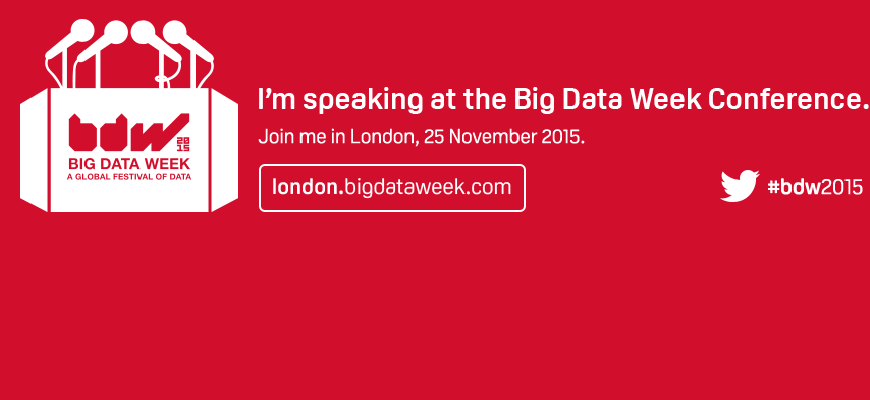Interview With Jane Zavalishina from Yandex Data Factory
This article takes part from the interview series with our speakers for this year edition of Big Data Week.
Forget Big Data, Think Machine Learning – Yandex Data Factory CEO, Jane Zavalishina, will be on November 25th on Big Data Week stage talking about how machine learning can be applied in different industries – including retail, advertising, gaming – and guide on where to start and how to incorporate these new technologies in the business strategies.
Built upon the real-time personalisation and predictive analytics technology of parent company, Yandex, the largest search engine in Russia, Yandex Data Factory helps clients improve their business and deliver measurable results through the exploitation of their own data. They offer Saas – driven machine learning services to a wide variety of data-reliant verticals, such as retail, financial services, travel, and telecoms, who wish to use their data for purposes such as improving personalisation, delivering tailored cross-sell and upsell recommendations, preventing customer churn, etc. The key technological stack of the company also includes computer vision, natural language processing and speech recognition.
We asked Jane about Big Data, her presence in the event and the data market evolution. See below a very interesting interview, from a CEO of a young company set to revolutionize the way we see machine learning today.
While Big Data is already a buzz term, what does it actually mean for you? (an old question with a fresh answer)
I think we should stop talking about Big Data. This term often creates confusion and make people think about petabytes and petabytes of logs and transactions that have nothing to do with their businesses. Whereas in fact often even “Small Data” that can be valuable, especially for companies from offline industries. At the same time, Big Data per se is just a Big Problem – of where to store it and how to process.
Instead, we should talk about Data as an asset that companies have, and the complementary solutions and technologies – Machine Learning in the first place – that can help to gain value out of it. And this value is not only in generating insights and providing decision support, as many see it, but in the possibility to automate decisions and optimise critical parts of your business to an extent that hasn’t been possible before.
Is it important to be data driven nowadays? If yes, why ( please use examples from your industry if possible)?
Absolutely. But again – and I really want to stress it – the key thing that the companies should consider on their way to become data-driven is how to extract value above just generating knowledge from the data. While BI is essential to guide the strategy, a great opportunity lies in the possibility to automatically predict the future and prescribe the actions that would influence it in a desired way. Without human intervention whatsoever. Instead of analysing the profiles and dividing your customer into a limited number of segments in order to decide on the best offer to send them, you can feed the machine with the data about the past and use it to automatically provided personal recommendations – targeted individually for each and every customer.
What are the main challenges a company encounters when starting to look at their data?
As we often see when working with clients – sometimes they do not even know which data they have available. It is stored in different systems and divided between departments. Another issue is that the data is often unstructured and not very clean which makes it harder to handle with typical tools. On top of that, the companies struggle to estimate its value. Here is actually when Machine Learning comes in hand. When using data for decision support, you cannot easily measure the value it brings. When developing Machine Learning-based solutions for specific business use cases – you know what metric you want to improve, and you can always see the ROI.
Aside from that, a great challenge is the culture. Companies need to stop seeing data as solely an IT issue, and should start developing a data strategy and business use cases across all departments. They also need to introduce the culture of experiment and change certain processes in order to be able to gain real value out of new technologies.
Who should come and listen your talk in Big Data Week?
All the businesses who are trying to understand “what it’s in for me” and what is hidden behind the buzzword. And if you are a business manager and you think that it is not a topic for you, but for the “technical guys” – you are absolutely invited. In my talk I will explain why and how all managers, marketers and even guys from the production line should start thinking about Machine Learning.
Do we still need data scientists with all the tools existing today for data cleaning, analysis, machine learning?
Oh yes. And we will need even more in the coming years. Tools are just tools. You need smart people to operate those, to decide on the right one for the exact task, to formulate and define the problem, to bring all the data together and so on. And to build and develop the tools and end solutions, of course. At the same time, I expect that in the end only the companies where Machine Learning is close to core business will have huge data science teams. All the others will be greatly relying on external services – simply because you cannot develop everything in-house. Still, that means that you will need to have competent team inside, who will be deciding on the business cases for data science and choosing, managing and comparing external service providers.
Who are your typical customers, to which sectors/type of companies are you addressing your services?
At Yandex Data Factory, we focus on adapting high quality Machine Learning algorithms developed inside Yandex, for solving business tasks. That means that the key part of our offering is mathematics, which is universal. And can be applied to many industries and use cases: from predicting road accidents to providing personalised upsell recommendations for a bank. We work with companies in finance, retail, telecom, gaming, manufacturing, healthcare and other industries.
Of course, the most obvious and somewhat easier cases are those related to marketing and customer relationship management – here you can measure the result in a fast and direct way, by simply comparing the effect of your new personalised marketing campaign to the old approach, and evaluate the ROI. At the same time, we already have projects that show great potential for Machine Learning applications in more “equipment-heavy” industries – such as manufacturing or utilities – where vast amounts of machine-generated data can be used for process optimization.
Nowadays there are a lot of companies (utilities, banks, …) starting to develop services based on their data. Where do you see the data market going from this perspective?
As I see it, the data owned by just one company is usually not enough to build a service that brings significant value for external clients. On top of that, the development of the new products and services based on data is a totally separate business that a company should be ready to invest in and know how to market. Taking this into account, I expect that we will rather see the appearance of third party companies that would make it their core business – merging the data that is provided by banks, utilities companies and so on, and building and marketing new products, thus helping the companies to monetize their data.
Jane is CEO of Yandex Data Factory. She ensures that the company fulfills its mission of finding new ways for utilizing Yandex’s big data processing and machine learning technologies outside their core applications and markets.
Before taking up the leadership of this new business, Jane was serving as Chief Executive Officer of Yandex’s e-commerce payment service Yandex.Money, which she joined in 2005. Under Jane’s leadership Yandex.Money became one of the strongest players on the country’s e-commerce market and one of the most recognized e-payment brands in this county.
Prior to becoming head of Yandex.Money, Jane served as Chief Product Officer at Yandex. In this role, she helped Yandex to reach the leading position on the internet market in Russia and gain popularity with its wide range of web-based products and services.
Alongside her duties as CEO of Yandex Data Factory, Mrs Zavalishina remains on the board of directors of Yandex.Money.


